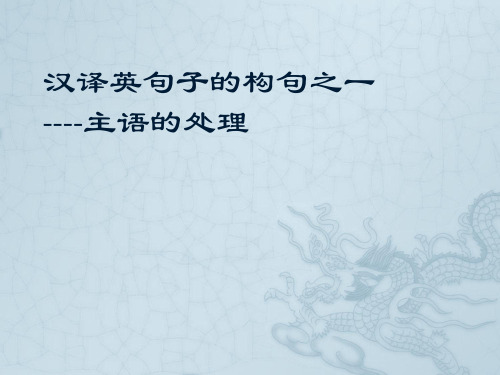汉译英时主语的添加与选择
汉译英主语的选择we

练习:
要实现统一,就要有个适当方式。 要坚持把教育放在优先发展的战略地位, 加快各级各类教育发展。
To achieve a peaceful unification, we must find a proper means. We need to make education a strategic priority and accelerate the development of all types of education at all levels.
主语与主题
--兼论主语的选择
练习
操作说明不应使用长词或复杂结构。 这本书整整写了两年了。 要多接触,增进了解。 一看到那棵大树,我便想起了童年的情 景。
Long words or complex constructions should not be used in instructions for operation./Instructions for operation should not use long words or complex constructions . This book took me two entire years to write./The writing of this book lasted two entire years.(?)/ It took me two entire years to write this book.(?) Let there be more contact for more understanding between the two sides. The sight of the big tree always reminds me of my childhood.
汉译英之主语的选择全解课件

在汉语中,无主句和省略主句是比较常见的句型,但在英语中,无主句和省略主句的使用相对较少。在汉译英中 ,需要根据英语的表达习惯对无主句和省略主句进行处理,可以采用增补主语、变换句型等方法,使得译文更加 符合英语的表达习惯,提高译文的准确性和流畅性。
汉译英主语选择的
03
方法与技巧
直译法
总结词
功能
主语在句子中起到引导句子的作 用,是句子逻辑和语义的核心, 同时影响谓语和宾语的语法结构 和意义。
主语选择的重要性
01
02
03
语法正确性
选择正确的主语可以使句 子语法结构完整,避免出 现语法错误。
语义清晰性
选择合适的主语可以明确 动作的执行者或状态的变 化者,使句子的语义更加 清晰。
语境适应性
详细描述
在汉译英过程中,有时候原文中的一些词汇或短语在英文中并不需要翻译出来,因为它 们对于句子的结构和意义没有实质性的影响。省略法可以在主语选择时使用,例如在翻
译一些重复的词汇或短语时,可以省略其中的一部分,以使译文更加流畅、自然。
汉译英主语的特殊
04
处理
主谓一致的处理
主谓一致是指英语句子中主语和谓语动词在数、时态和语态上保持一致。在汉译 英过程中,需要根据英语语法规则,选择适当的主语形式,以确保句子结构正确 。
主语与谓语逻辑关系混乱
主语与谓语逻辑关系混乱是指英语主语与谓 语在逻辑上不一致,导致句子意义不明确。
在进行汉译英时,需要特别注意主语与谓语 的逻辑关系,确保它们在时态、语态和语气 等方面保持一致。例如,“如果明天下雨, 我们就不去公园了”应该翻译为“If it rains tomorrow, we won't go to the park”,
汉译英之主语的选择全解课件

例如:使用我们的护肤品,让你的肌肤焕发 年轻光彩,重拾自信美丽。
06
总结与展望
汉译英主语选择总结
明确句子主谓关系
在翻译过程中,首先需要明确原 句的主谓关系,即确定句子的中 心思想,这将有助于我们选择合
适的主语。
避免冗余和歧义
在翻译过程中,要注意语境对主语选择的影响。不同的语境下,可能需要选择不同的主语 。例如,在描述一个物体的位置时,汉语中通常使用物体作为主语,而英语中则更倾向于 使用地点作为主语。
根据语言习惯选择主语
在翻译过程中,要注意不同语言习惯对主语选择的影响。不同语言习惯下,主语的类型和 位置可能会有所不同。因此,在翻译时要注意根据目标语言的习惯选择合适的主语。
02
例如:在2023年,中国成功发射 了嫦娥五号月球探测器,实现了 中国航天史上的又一里程碑。
科技文献类实例分析
科技文献类文章通常以“事物”或“ 现象”作为主语,以此来突出科学的 严谨性和客观性。
例如:在量子力学中,波粒二象性是 一个非常重要的概念,它指的是粒子 可以同时具有波和粒子的属性。
广告文案类实例分析
02
汉译英主语选择影响因素
语境因素
语言环境
在翻译过程中,需要考虑原文所处的 语言环境,以及该语言环境下的语法 和词汇特点,从而选择合适的主语。
文化背景
不同的文化背景可能会影响主语的选 择。在某些文化中,可能更倾向于使 用无主语句,而在其他文化中则可能 更常见使用主语。
主题因素
主题明确性
在翻译过程中,需要考虑原文的主题是否明确,以及主题对主语选择的影响。
主题复杂性
如果原文的主题比较复杂,可能需要拆分句子结构或者使用从句等方式来处理 ,以避免出现复杂的主语。
句子的翻译方法 -主语

原文的副词性成分取为译文的主语
已经有数千人在持续了一年的内战中丧生。 The civil war,which has been going on for a year, has claimed thousands of lives. 通过进一步研究,科学家们推测存在着一种迄今尚未 为人所知的粒子。 Further investigation led the scientists to conjecture the existence of a hitherto unknown particle.
原文的动词性成分取为译文主语
他的行为似乎无法解释。 There does not seem to be any explanation for his behavior. 必须特别强调我国某些政府官员贪污腐败的严重性。 Emphasis must be placed on the seriousness of corruption and embezzlement among some offic纳说来选择主语可以有以下规律: 原文的形容词性成分取为译文主语 原文的名词性成分取为译文主语 原文的副词性成分取为译文的主语 原文的动词性成分取为译文主语
原文的形容词性成分取为译文主语
我的头疼得要命。 I have a terrible headache. 此句译文可完全照搬原文结构:My head aches badly. 也可对用词稍加调整,译为:My head is killing me. 懒惰的人不会成功。 Laziness makes success impossible. 他的良心受到谴责。 He had a guilty conscience.
原文的动词性成分取为译文主语
我见到他就恶心。 The very sight of him makes me sick. 人们传说他要结婚。 Rumor has it that he is going to get married. 咋天他们表演得很成功。 Their performance yesterday was very successful. 我从来没那么想过。 The thought has never crossed my mind.
句子的翻译方法主语

The mastery of language is not easy and requires painstaking effort. (Mao)
汉英之间思维的巨大差异,并不能保证总能将汉语中 的主语完全地转换到英语中。直接转换虽然便捷,但 是所运用的场合有限。如果保留原来主语不妥,那么 就要另觅它法了。
可编辑ppt
4
重新确定主语
为保证译文逻辑通顺、行文流畅、语言自然地道,行 使与原文类似的功能,需要重新选择、确定主语。用 来替换原主语的,可以是句子中的其它成分,也可以 是句外的词语。
which shocked the rest of the world greatly.
可编辑ppt
7
重新确定主语
胎又瘪了。
We’ve got another flat tire. 语言这个东西,不是随便可以学好的,非下苦功不可。
Language is something difficult to learn well; to learn it well one has to study very hard.
可编辑ppt
6
重新确定主语
世纪之交,中国外交空前活跃。
The turn of the century finds China most active on the diplomatic arena.
At the turn of the century, China is very active in its diplomatic activities.
汉语句子的英译--主语的处理

汉译英中,主语的 确立是句子翻译的第一步。选择了一定的主 语,基本决定了句子构造的走向。主语选择恰当,句子就便于 构造了。常常选择不同成分作主语,决定了不同的组句方式。 例如: 1) 为了维持生计,有沉重和繁重的家务要干。不少家庭主妇被 家务活累坏了身体。 In order to make a living, there is a lot of heavy housework. As a result, many housewives break down. (?) In order to make a living, many housewives have to do a lot of housework so that they finally break down. (?) Revised: In order to make a living, many housewives have to do a lot of housework and eventually exhaust themselves physically. 主语选择合适, 便于构句
1) 由于肌肉和细胞的运动,身体不断地产生热。 Heat is constantly produced by body as a result of muscular and cellular activity. 2) 人们必须结合世界环境来认识和研究人口控制问题。 The problem of population control has to be recognized and approached in the context of the whole world. 3) 一九六四年十月中国爆炸了第一颗原子弹,使世界大为震惊。 China’s first atomic blast in October, 1964 was a great shock to the rest of the world. 4) 因为距离远,又缺乏交通工具,农村社会是与外界隔绝的。这 种隔绝状态,由于通讯工具不足,就变得更加严重了。 The isolation of the rural world because of distance and the lack of transport facilities is compounded by the paucity of information media.
英汉互译中对主语的处理

英汉互译中对主语的处理英汉互译是指将英文语言转换成中文语言或者将中文语言转换成英文语言的过程,它是外语学习与文学交流首要工具之一,也是桥梁与纽带,能够将两种不同文化异彩斑斓。
在英汉互译中,主语的处理是十分重要的,由英汉句子结构可以看出,两种语言的主宾句法有较大差异,因此,在英汉互译时应当正确把握主语的位置。
一、英译汉时注意主语的处理1、主语用it代替当出现复杂的复合句时,为了简化译文,可以用it作形式主语来代替真正的主语,这就需要注意,形式主语所作行为是否与真正主语完全一致。
2、名词性状语作表语当状语的位置在主语的前面时,可以用名词性的形容词来作表语,但在此种情况下,要注意,在换译后的句子中文字的位置应当与原句的排列一致。
3、主语的物主代词可以删去在英汉互译中,英语中的物主代词可以删去,直接用名词作主语,把英语中的物主代词省略掉,即可节约篇幅,使汉语句子简洁、亲切。
二、汉译英时注意主语的处理1、直接将汉语主语对应一个英文名词作主语汉译英时,可以直接将汉语中的动词或有生命的主语,对应英语中一个名词作为句子的主语,以简化译文,汉语中有生命的主语,也可以译成英语中的一个名词作为句子的主语,但是译成的英文要注意保持原意,而不能出现歧义。
2、不定式汉译英时,有时不定式也可作英文句子的主语。
当汉语中的主语是动词时,我们可用不定式作主语,可以使句子的表达更加准确,而且更加简洁明快。
3、省略主语汉译英时,可以将主语省略,凡是句子无必要强调或者已知语境中得出结论时,可以将主语省略,但这种情况只限于那些可以由读者自行推测出所提及的事物时。
以上是英汉互译中对主语处理的相关内容,从中可以看出,英汉互译当中,主语的处理是十分重要的,只有正确把握其语义,才能准确地体现出句子的意思,从而使英汉互译更准确。
汉译英时 如何确定主语

以原句主语作译文主语
• 英语句中的主语只能是名词、主格人称代 词或名词性的词语。当汉语原文有明确的 主语,而且该主语由名词或主格人称代词 充当时,我们可以原主语作为英译文的主 语。如:
• 1.幽默是智慧、学识、机敏的结晶,幽默 在我们社会、家庭、工作、学习、生活中 不可或缺。 • Humor is the crystallization of wit,knowledge, and resourcefulness.It is also indispensable to our work,study,family,society,and life is in general.
unlessweburstoutweshallperish添补包括作者和读者在内的we作主语成功地传达了鲁迅对反对派屠杀进步人士的愤慨对国家及民众前途和命运的担忧还有他激励人们奋起反抗的呐喊
汉译英时,如何确定主语?
吴诗君 李双 蒋亚萍 曹璐 杨青慧
主语的确定:
• 以原句主语作译ቤተ መጻሕፍቲ ባይዱ主语
• 重新确定主语 • 增补主语
重新确定主语
• 在许多情况下,我们需要重新选择和确定 主语,以保证译文逻辑通顺、行文流畅、 语言自然地道,行使与原文相似的功能。 可以是句子其他成分,也可以是句外的词 语。如:
世纪之交,中国外交空前活跃
• a.The turn of the century finds China most acti-ve on the diplomatic arena. • b.At the turn of the century,China is very active in its diplomatic activities. • 有比较就有鉴别。将the turn (of the century) 替换原主语“中国”的译文a,比照原主语 的译文b地道、有韵味。
- 1、下载文档前请自行甄别文档内容的完整性,平台不提供额外的编辑、内容补充、找答案等附加服务。
- 2、"仅部分预览"的文档,不可在线预览部分如存在完整性等问题,可反馈申请退款(可完整预览的文档不适用该条件!)。
- 3、如文档侵犯您的权益,请联系客服反馈,我们会尽快为您处理(人工客服工作时间:9:00-18:30)。
汉译英时主语的添加与选择可以说,单就句子成分而言,英汉两种语言对主语的看法分歧最大。
汉语不强调主语,因为汉语中的大多数句子都是话题结构。
因此只要和述题有语义上的联系,即使没有直接的逻辑关系和语法搭配关系,任何内容、成分和词类都可处在主语的位置上。
但是在英语中,句子的主语和谓语一定要有直接的逻辑关系和语法搭配关系。
一,主语的添加与汉语不同,主语是英语句子不可或缺的重要成分。
翻译时如碰到汉语中的无主句或省略主语的句子,就需要添加主语。
1),基本路线要管一百年,动摇不得。
Version 1: We should adhere to the basic line for a hundred years, with no vacillation.Version 2: The basic line should be adhered to for 100 years, and there must be no vacillation.2),说过来,说过去,就是一句话,坚持这个(三中全会以来的)路线、方针、政策不变。
Version 1: After all that’s been said, I can sum up our position in one sentence: we shall keep to this line and these principles and policies. Version 2: After all that’s been said, one sentence sums it up: we will stick to this line and these principles and policies.3),(不要怕犯错误)坚持这种态度就不要紧,就不会犯大错误。
Version 1: So long as we stick to this attitude, it will be all right and we will not commit any major mistakes.Version 2: So long as we keep to this attitude, everything will be all right, and we shall not make any major mistakes.二,主语的选择与确定1, 出于连贯的考虑对主语进行选择与确定一个英语段落或句群的句子的话题有向心性。
选择英语的句子主语,要考虑衔接紧凑、语义连贯的因素。
相邻的英语句子的主语不宜频繁变换,应尽量保持一致。
英语中有一条很重要的修辞原则,即平行一致原则(parallelism), 就是这种要求的集中体现。
如:1) 自十九世纪末,中国开始举办师范教育。
1949年中华人民共和国成立之后,在各级政府的重视和关心下,中国师范教育进入前所未有的发展阶段。
Teacher education began in China toward the end of the 19th century. Since the founding of the PRC in 1949, it has undergone unprecedented development thanks to solicitude and support of the central and local government. (同一个话题,统一主语,加强连贯)2) 在科学技术迅猛发展的今天,振兴经济的希望在于教育,教师队伍的数量和质量对教育发展具有决定性的影响。
Today when there is a rapid advancement in science and technology, education becomes vital to the growth of economy. Its development,however, is determined by the number and professional expertise of teachers.3) 机构投资者和个人投资者踊跃购买每年发行的国库券。
企业债券因为期限短,利率高于银行存款利率一到两个百分点,因此也十分受欢迎。
人们争相购买债券,往往前一天晚上就在银行外排队,一个亿的债券几天就一售而空。
Treasury bonds issued each year has been the most popular with institutional and individual investors. Enterprise bonds are also popular because they have a short maturity and offer an interesting rate of 1%-2% more than the average bank deposit rate. Often RMB 100 million worth of enterprise bonds are subscribed within a few days by anxious investors who queue overnight outside banks.4) 一天,父亲来封快信,上面说:“顷得汝岳丈电报。
”One day an express came from his father. It read as follows: “I have just received a telegram from your father-in-law…”2, 出于信息重心的考虑重新选择句子的主语。
2.1 汉语句子的机构性主语需改成更重要的信息。
此时往往还需采用相应的被动结构。
如:1)(在抗洪斗争中,中国人民显示了令人叹服的守堤防洪的能力。
)例如这次国家调动了160万军队去帮助守护大堤,将被洪水淹没地区的老百姓迁走。
For example, 1.6 million troops have been mobilized to help protectthe dikes and to move people out of areas being flooded.2) 上海采取了一系列优惠政策来吸引外资。
A series of preferential policies have been adopted in Shanghai to attract foreign capital.3) 在过去三年内,浦东新区完成了总投资额在150亿元以上的10项重大基础设施的建设。
Over the past three years, 10 infrastructure projects, involving a total investment of over 15 billion yuan, have been completed in the Pudong New Area.2.2 汉语句子的时间性主语多处理为状语,此时得重新确立英语句子的主语。
如:1) 有谣言说,明年年初要实行价格改革。
Rumor has it that a price reform will be instituted at the beginning of next year.2) 明年将出版更多的儿童读物。
More books for children will be published next year.2.3 汉语句子的泛指性主语如“人们”“我们”等并无实质性内容,在英语句子中往往可以省去,转而采用被动结构,让其他更重要的信息充当主语。
如:1) (占中国总耕地面积3%的450万公顷的农作物被毁。
工厂被迫停工,产量受到影响。
客运和货运也被迫中断。
)在未来的许多岁月里,人民都会感受到洪灾对中国经济的总体影响。
The overall effect on China’s economy will be felt for many years.单独译一句,用“人民”作英语句子的主语没有问题。
但由于这一句是跟在“农田遭毁”、“工厂停工”、“铁路中断”的几个句子之后,冒出一个“人民”作主语反而不妥。
还不如用“对国家经济的影响”作主语更妥当。
2) 现在,我们已经把国家的投资大量向西部地区倾斜,譬如,我们最近宣布的“西气东输”工程。
Now it is decided that the State investment will tilt in favor of the west. The recently announced decision to press with the project of transmitting natural gases from the west to the east is a case in point. 3,英语句子的主语和谓语必须有严格的逻辑关系,而且要符合搭配习惯,所以翻译中也常考虑改变句子的主语。
汉语中存在大量的人称代词或名词所有格+名词的主语短句结构,翻译时可把这样的主语短语分开,让人称代词或名词所有格充当主语,而把原来的名词中心词处理为状语,这样往往就符合搭配了。
如:1) 因为我们国家的建设事业不仅仅需要工程师和科学家,同样需要各行各业的能工巧匠。
For China in her development needs not only engineers and scientists, but skilled workmen of different kinds.2) 我们极好的条件是有四万万七千五百万的人口和九百六十万平方公里的国土。
We have very good favorable conditions: a population of 475 millionpeople and a territory of 9.6 million square kilometers.3) 我们的事业从胜利走向胜利。
Version 1: Our course goes from one victory to one another.Version 2: We have won one victory after another for our task.4) 这些快速食品的味道还需大大改进。
These fast products leave much to be desired when it comes to flavor.5) 任何新生事物的成长都是要经过艰难曲折的。
All emerging things are bound to experience difficulties and setbacks in their growth.6) 这个战略思想现在已经有了实施的机遇。
